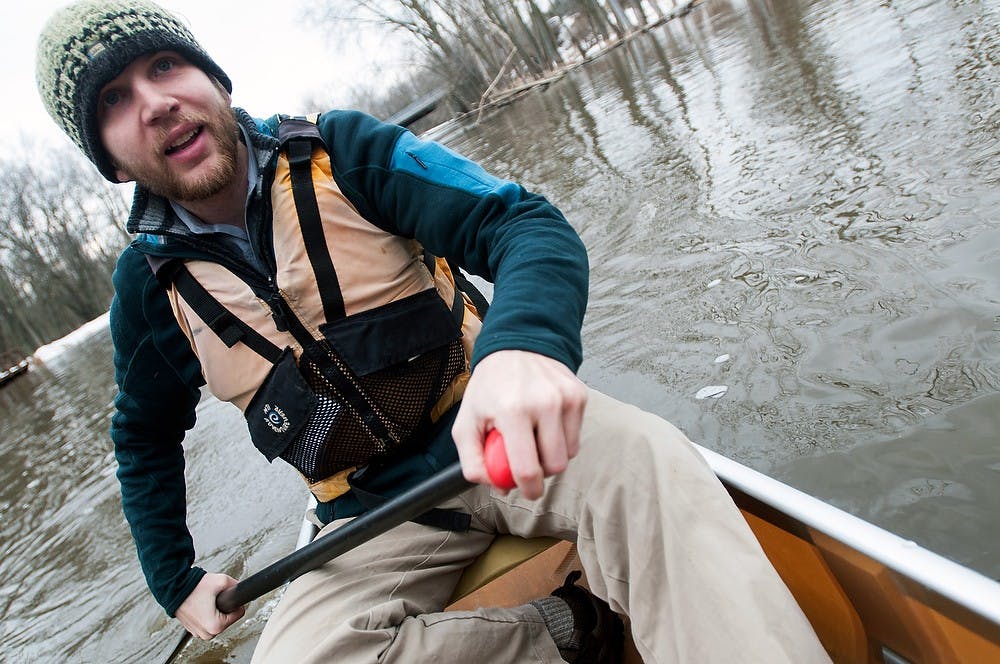A constant, gentle movement from side to side. The sound of water crashing against the black and orange paddles. The paddle is heavy, but the idea of being in that watercraft for more than two weeks is a heavier and different weight to bear.
This May, recent graduate Tim Muhich will attempt to break the world record of fastest travel in a canoe down the Mississippi River, the third-largest river in North America.
“My father told me that I should have at least one trip of a lifetime a year, and this is the trip of a lifetime of this year,” said Muhich, who currently is pursuing his teaching certificate.
Muhich and fellow MSU alumni Clint Adams, Tom Baweja and Colin Bright will be paddling 2,347 miles down the river.
“My family has been canoeing for a long time, so it’s in my blood and it is something that I have to do,” Muhich said.
Muhich and his partners met at an MSU Outdoors Club meeting, an organization where he introduced the sport of canoeing to his teammates.
After paddling for six weeks from Toledo, Ohio to Louisiana in 2012, Muhich realized he could beat the world record of the fastest travel down the Mississippi River.
“I saw the guy who has the current record fly past me in a really fast canoe, and I said if we have the right equipment we can break his record,” Muhich said.
In 2003, Bob Bradford and Clark Eid became the world record holders after traveling the Mississippi River in 18 days, four hours and 51 minutes.
Within a week after Muhich’s epiphany, he and his canoe partners had the plan for their voyage down the Mississippi River set. They are projecting that they will beat the record by a couple of hours.
The group has been practicing several times a week for the past few months, even when the temperatures dipped in the single digits.
“There were parts (in the winter) that it was zero degrees and we were paddling,” Muhich said.
The team’s mode of transportation will be a 64-pound, 23-foot long canoe with four seats. The entire canoe is made of Kevlar, a strong, flexible and waterproof fiber.
The preparation of the trip costs approximately $8,000, but the group has received sponsorship from donations and companies.
The group of four will depart from Lake Itasca, Minn., and will travel an average of 127 miles per day for 18 days until their arrival in Mile Zero, near Louisiana.
The biggest obstacle that the team might encounter during the journey will be related to climatic conditions such as strong winds or tornados. Aside from those extremely severe conditions, they don’t plan on letting anything stop them.
“You don’t cancel a football game because of bad weather, and you don’t cancel the Mississippi challenge because of it either,” Muhich said.
The team will have two food drops while on their trip. People will meet them at certain points along the trail to provide them with sustenance.
Using the same technology that the U.S. Army uses for cooking, the team will be able to cook hot meals in the boat every other day.
As for hygiene, the group isn’t too worried.
Support student media!
Please consider donating to The State News and help fund the future of journalism.
“For the bathroom, the one word answer is jars,” Muhich said.
The team will alternate one person sleeping in the front of the canoe while the other three paddle through the night.
Muhich said they do have safety concerns and issues while canoeing.
“We go paddling several times a week and we are very careful and we follow every precaution necessary,” Muhich said. “If you don’t do things like this and you stay back home, you will be 80 years old and you will look back and regret that you didn’t do it.”
Discussion
Share and discuss “'Trip of a lifetime'” on social media.





